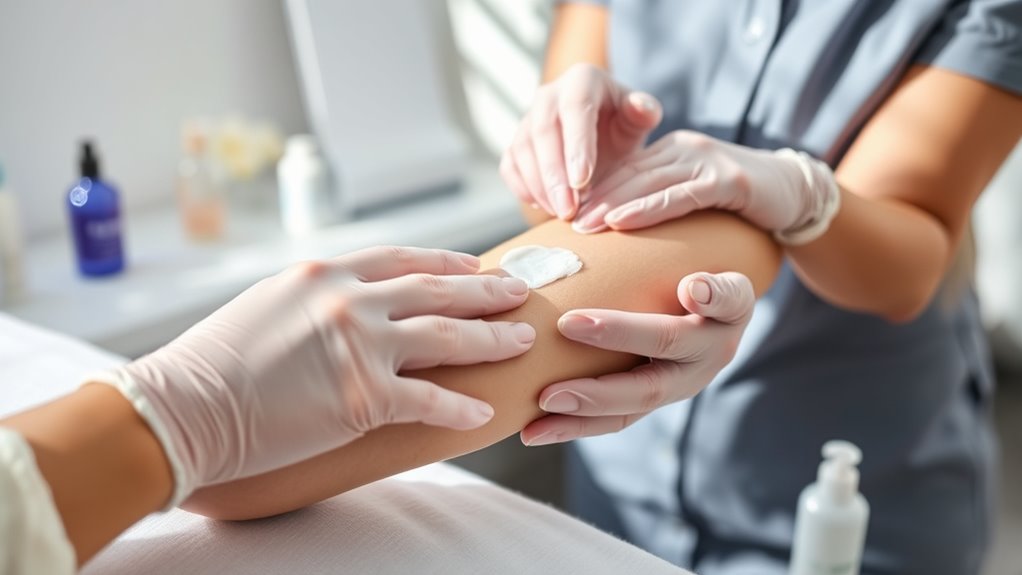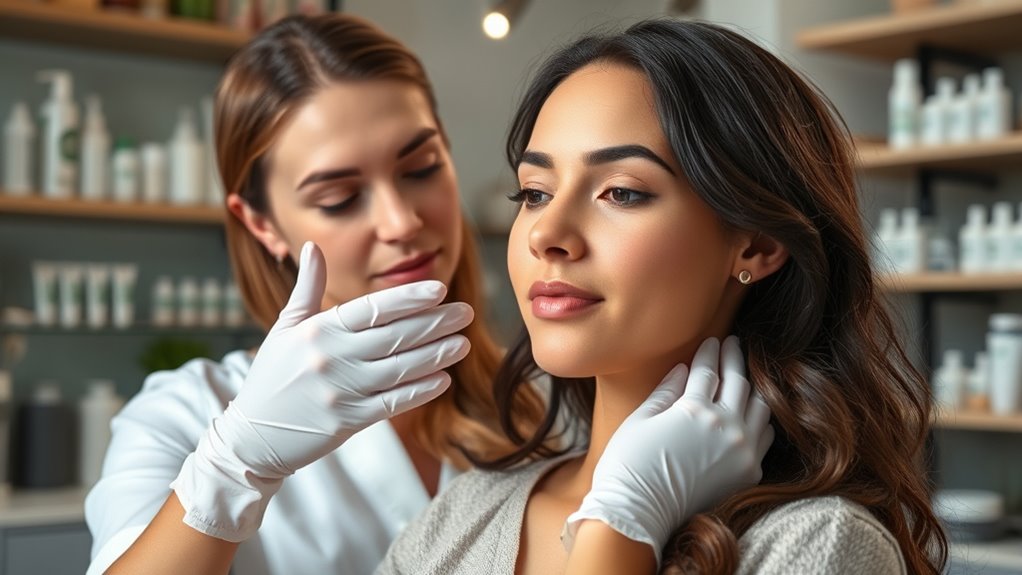To serve clients with sensitive skin and allergies safely, prioritize hypoallergenic products free from fragrances and harsh chemicals. Always perform allergy tests on discreet skin areas before treatments to prevent reactions. Communicate openly with your clients about their sensitivities and monitor their skin’s response throughout procedures. Encourage at-home patch tests and educate them on gentle routines. Incorporating these practices guarantees a safer experience, and you’ll discover more strategies to build client trust and confidence along the way.
Key Takeaways
- Conduct thorough allergy testing on sensitive clients before treatment to identify potential reactions.
- Use only hypoallergenic, fragrance-free, and dye-free products designed for sensitive skin.
- Maintain open communication and monitor the client’s skin response throughout the procedure.
- Educate clients on at-home skincare routines, emphasizing patch testing and gentle product choices.
- Create a safe environment by integrating allergy testing as a standard practice and being vigilant for reactions.

If you have sensitive skin, practicing gentle and mindful skincare is essential to prevent irritation and maintain your skin’s health. When serving clients with sensitive skin, it’s crucial to prioritize products and procedures that minimize the risk of adverse reactions. One effective way to do this is by focusing on hypoallergenic ingredients, which are formulated to reduce the likelihood of allergic responses. These ingredients are free from common irritants such as fragrances, dyes, and harsh chemicals, making them safer choices for delicate skin. Incorporating hypoallergenic products into your treatments shows clients that you care about their safety and comfort, helping to build trust and confidence.
Before using any new skincare products or treatments, allergy testing is an important step. Allergy testing involves applying a small amount of the product to a discreet area of the client’s skin, usually behind the ear or on the inner forearm, to check for any adverse reactions. This simple precaution can prevent discomfort, redness, or more severe allergic responses during or after the treatment. Make allergy testing a standard part of your consultation process, especially when working with clients who have known sensitivities or previous allergic reactions. It demonstrates your commitment to safety and allows you to customize skincare routines that suit each individual’s needs.
Always perform allergy tests before new skincare treatments to ensure safety and prevent adverse reactions.
Being attentive to your clients’ histories is equally important. Ask detailed questions about their skin sensitivities, allergies, and past reactions to skincare products or environmental triggers. This information helps you select suitable products and avoid potential irritants. During the treatment, communicate clearly and ask your clients how their skin feels throughout the process. If any discomfort or redness appears, be prepared to pause and reassess your approach. Sometimes, even hypoallergenic ingredients can cause reactions in very sensitive individuals, so staying vigilant is essential.
Moreover, educate your clients about the importance of patch tests and the use of gentle, fragrance-free products at home. Encourage them to read labels carefully and avoid products with known irritants. Providing them with guidance on proper skincare routines can help prolong the benefits of your treatments and prevent future issues. By integrating allergy testing, selecting products with hypoallergenic ingredients, and maintaining open communication, you create a safe environment for clients with sensitive skin. Your attentiveness to these practices not only enhances their experience but also fosters long-term loyalty and trust. The goal is to make every client feel comfortable, respected, and cared for, ensuring their skin remains healthy and radiant. Additionally, educating clients about the importance of product ingredients can empower them to make better choices for their skin health.
Frequently Asked Questions
How Can I Identify Hidden Allergens in Skincare Products?
To identify hidden allergens in skincare products, start by carefully reading ingredient detection labels. Look for common allergens like fragrances, preservatives, and certain dyes that might not be obvious. Trust products with clear, accurate labeling, and consider patch testing new items before full application. Always stay informed about ingredient updates, and don’t hesitate to ask manufacturers about any unknown substances. This proactive approach helps you avoid adverse reactions and guarantees safe use.
Are There Specific Tools to Minimize Cross-Contamination?
Think of your workspace as a high-tech laboratory, where tools must be pristine. To minimize cross-contamination, you should follow strict sanitization protocols and guarantee proper tool sterilization after each client. Using disposable applicators when possible adds an extra layer of safety. Regularly clean and disinfect surfaces and tools, and avoid reusing products. These practices help protect sensitive skin and reduce allergen transfer, keeping your clients safe and confident.
What Emergency Procedures Should Staff Follow for Allergic Reactions?
When a client has an allergic reaction, you should follow your emergency protocols immediately. Stay calm, assess the severity, and call emergency services if needed. Manage the reaction by administering any prescribed medication, like an epinephrine auto-injector, if available, and keep the client comfortable. Document the incident accurately. Reaction management is vital, so make certain you’re trained regularly on emergency procedures to protect your clients’ safety effectively.
How Often Should Staff Update Their Allergy Training?
You should update your allergy awareness training at least annually to stay current with best practices and any new allergens. Regular staff education guarantees everyone remains knowledgeable about allergy protocols, recognizing symptoms, and emergency procedures. Keeping training consistent helps prevent mistakes and keeps clients safe. By scheduling regular updates, you demonstrate your commitment to providing a secure environment for clients with sensitivities or allergies.
Can Clients With Multiple Allergies Receive Personalized Safe Treatments?
You can definitely provide clients with multiple allergies personalized safe treatments. Start by conducting thorough allergy testing protocols to identify specific sensitivities. Then, develop customized treatment plans that avoid known allergens and use hypoallergenic products. Always communicate with your clients about their allergies and monitor their reactions closely. This approach guarantees their safety and comfort, allowing you to deliver effective, tailored treatments without risking allergic reactions.
Conclusion
Think of caring for sensitive skin like tending a delicate garden. With patience, gentle hands, and mindful choices, you nurture growth without causing harm. Each careful step you take acts as sunlight and water, fostering resilience and beauty. Remember, your attentiveness creates a safe haven where your clients can blossom with confidence. By respecting their unique needs, you become the gardener of trust, cultivating a space where sensitive skin can thrive and flourish.









